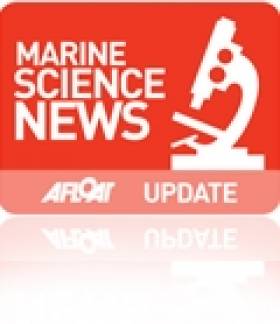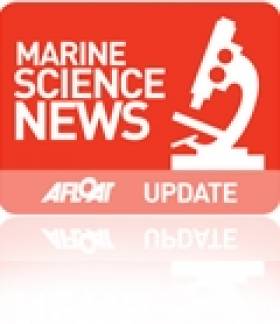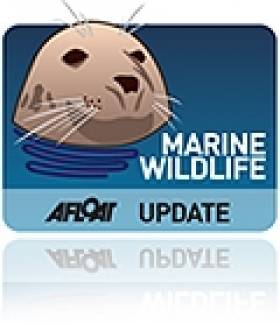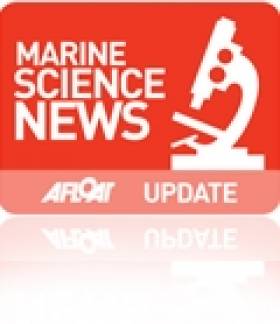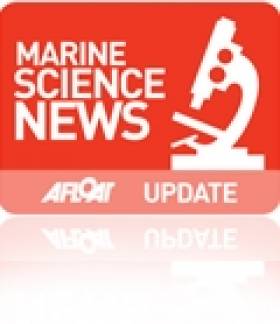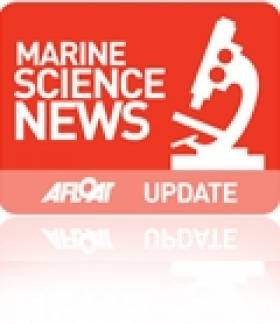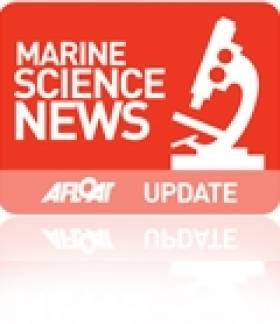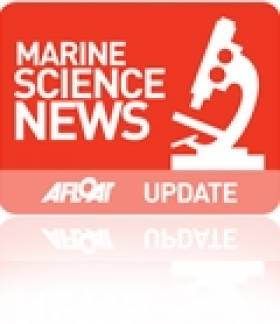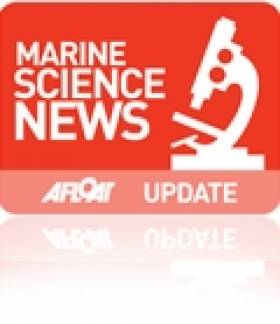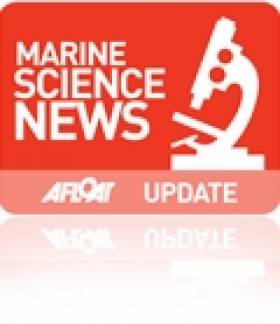Displaying items by tag: marine science
#MarineScience - Gathering more than 60 marine scientists and research fleets operators from all European eco-regions, the kick-off meeting of the European project EUROFLEETS2 was held in Brest, France from 19-21 March last at the invitation of the French Research Institute for the Exploitation of the Sea (Ifremer) and the French Polar Institute Paul-Emile Victor (IPEV).
Thirty-one research organisations, research fleet managers, universities, and industrialists from 20 EU members states or associated countries participate in the EUROFLEETS2 project, whose main objective is the integration of research fleets currently managed at national level.
This project amplifies the effort initiated since 2009 with EUROFLEETS, which ends in August this year. Again co-ordinated by Ifremer, EUROFLEETS2 has a strong operational component. The project receives significant funding from the European Commission (€9 million of a total budget of approximately € 10.8 million) over four years.
“This provides a fantastic opportunity for Irish researchers to access a wide variety of vessel and equipment across Europe,” said Aodhan Fitzgerald of the Marine Institute’s Ocean Science Services Team. “The Marine Institute is proud and pleased to offer ship time on the national research vessels RV Celtic Explorer and RV Celtic Voyager as part of this project.”
EUROFLEETS2 is organised into three complementary activities – trans-national access; joint technological research; and networking - promoting information sharing, identification of new collaborative frameworks, development of common software tools and also testing innovative integration schemes.
Trans-national access offers the opportunity, fully funded by EUROFLEETS2, to international scientific groups to access research vessels on the basis of scientific excellence of the cruise proposals. After seven European calls for ship-time organised within targeted maritime regions, these scientific groups will embark on eight global/ocean and 14 regional European research vessels distributed all over European and world seas and oceans.
Two new initiatives are also planned in EUROFLEETS2: the first aims to attract scientific leaders and/or non traditional end users to make proposals for a flagship project involving several vessels (‘super-integration’ call for ship-time), while the second makes available an original set of five underwater vehicles or scientific embarked equipment.
Joint research, through dedicated actions, contributes to more modern infrastructures and enriched information services. Three key activities are considered: the definition of regional research vessels guidelines and generic designs, the development of innovative functionalities for underwater systems, and the implementation of data acquisition systems in standardised formats, contributing to a higher interoperability between research vessels.
Networking activity will consist in working groups for a better co-ordination of European research fleets. It will aim to establish a common strategic vision including polar research fleets, experiment new integration schemes like the virtual fleets and strengthen links with industry. Floating universities will complement the actions already undertaken for the training of young European scientists.
The long-term objective of EUROFLEETS2 is to prepare the insertion of a group of innovative and inter-operable regional research vessels in the ESFRI(European Strategic Forum on Research Infrastructures) roadmap.
Calls are now open for fully-funded ship time in polar and subpolar regions as well as for expressions of interest in super-integration.
For the former, EUROFLEETS2 can provide 200 fully funded days of ship time and 104 fully funded days of marine equipment to carry out ship-based research activities within any field of marine sciences. The application deadline is 24 May 2013.
As for the latter, the call seeks a cross-cutting proposal that needs to mobilise a combination of EUROFLEETS research vessels together with other appropriate scientific tools like national research vessels, research planes or onshore infrastructures with their own EU or national funding. All EUROFLEETS research vessels and equipment are available for this call. The expression of interest is not binding but desirable.
The deadline for applications is 15 May 2013. Logistically accepted pre-proposals will be invited to submit a full proposal from 14 June till 16 September 2013.
For more information and eligibility criteria visit www.eurofleets.eu.
Cork Schools Complete Marine Science Programme
#marinescience – The Lifetime Lab and the Marine Institute have presented up to one thousand 3rd and 4th primary school students with the Explorers Certificate of Participation, recently after they had completed the Explorers Primary Marine Science Workshops held at the Lifetime Lab, Cork over the last two weeks (11th – 22nd March).
Speaking about the popular workshops, manager of the Lifetime Lab and organiser of the workshops Mervyn Horgan said, "The high level of participation across 21 primary schools reflects Cork's rich maritime history and continued interest in the marine sector. It was fantastic to engage with these students through marine related experiments and activities on topics such as the Real Map of Ireland showing Ireland's marine resource and identifying marine species. The students have gained a wide range of skills that will hopefully encourage future studies in science, maths and geography".
Thanking the Marine Institute for their involvement with the workshops he added, "Raising awareness of marine science in classrooms brings long term benefits. The Explorers Education Programme and workshops are an innovative way of engaging in science education, combining topics of sea life, science and geography with practical experiments and activities. The support provided by the Marine Institute for these workshops ensures that students become interested in Ireland's marine resources and its future development early in their education".
The Explorers Education Programme seeks to develop an interest among primary school students in Ireland's extensive 220 million acre marine resource, which is one of the largest in the EU. The programme and workshops are currently used by over 50 schools reaching over 5000 thousand students throughout Ireland.
The programme aims to raise awareness and interest in Ireland's marine resource, oceans and seashores through teaching cross curricular lessons and activities. A wide variety of marine based lesson plans, activities and science experiments, including details on the Real Map of Ireland, can be downloaded from www.explorers.ie. The Explorers Education programme was developed by the Marine Institute in collaboration with a number of key partners including Galway Atlantaquaria, Sealife Bray Aqauriaum, Blackrock Education Centre, Galway Education Centre and the Lifetime Lab, Cork.
Schools awarded with the Explorers Education Certificate of Participation:
St Patrick's BNS, Gardiners Hill
Cork Educate Together
Scoil Íosagain, Farranree
St John's GNS, Carrigaline
Holy Cross Mahon
St. Luke's NS,O' Mahony's Ave Cork
GlenFlesk NS
Eglantine GNS, Douglas
Scoil Maria Assumptha
Our Lady of Lourdes, Ballinlough
Sundays Well BNS
Glasheen BNS
Scoil Mhuire Junior School
Glasheen GNS
Scoil Mhuire Gán Smal
St. Anthonys BNS, Ballinlough
Beaumount GNS
Scoil an Spioraid Naoimh BNS
Scoil Oilibhéir
Irish Scientist's Role In Remarkable Giant Squid Discovery
#MarineWildlife - An Irish marine scientist has contributed to new research which seems to indicate that all giant squid in the world's oceans belong to a single species.
The Irish Times reports that Dr Louise Allcock of the Ryan Institute at NUI Galway is part of the team at the University of Copenhagen that has published its findings in the Proceedings of the Royal Society journal.
In studying the genetic code of the mysterious ocean beasts - which until the 1800s were thought to be a myth - the team discovered that what were previously thought to be distinct species for each of the world's major oceans seem to be related as a single population.
The team described the "extremely low genetic variability" they discovered among the squid samples taken from around the world as a "very unusual" development.
Live footage of the rarely seen marine creatures was captured for the first time last summer by a documentary crew in Japanese waters, as previously reported on Afloat.ie.
#MarineScience - An American university is teaming up with marine experts in Dingle to offer advanced marine biology classes.
As the Fairfield Sun reports, the biology department at Sacred Heart University in Connecticut is collaborating with scientists and staff at the Dingle Oceanworld Aquarium to offer the advanced classes to undergraduate and postgraduate students alike, beginning this May.
It's expected that the Coastal Study Centre programme will eventually provide both semester-long and short courses to take advantage of the aquarium's advanced research facilities, and will also accommodate students doing relevant thesis field work.
“Very few primarily undergraduate institutions have as strong a coastal focus as Sacred Heart does, which is only enhanced by our proximity to Long Island Sound,” said John Rapaglia, assistant professor of biology at Sacred Heart.
“Dingle Harbour’s semi-rural to rural location creates a nice juxtaposition to the highly urbanised Long Island Sound.”
Sacred Heart already has an established campus in the Kerry Gaeltacht town where students can take classes on Irish and Celtic history and heritage among other subjects.
The Fairfield Sun has more on the story HERE.
Pioneering Plan To Recycle Plastic Waste From The Sea
#MarineScience - A green cleaning brand plans to use science to recycle plastic waste from the sea in the production of a new type of sustainable plastic bottle.
The Guardian reports that Belgian firm Ecover is working with plastic manufacturer Logoplaste to combine plastic taken from the sea with recycled plastic and a type of plastic made from sugar cane known as Plantastic.
Chief executive Philip Malmberg said: "We won't have a definitive figure on the amount we will retrieve, we are just hoping to get as much as is possible and give fishermen an incentive to join the initiative and help clean the seas."
Plastic waste accounts for almost 60% of all litter on Britain's beaches, according to stats from the Marine Conservation Society - and can also cause great harm to marine wildlife, after recent reports that a sperm whale washed up dead in Spain had swallowed 17kg of plastic waste dumped by farmers growing vegetables for UK supermarkets.
It's hoped that boats can be outfitted with special equipment that will allow them to collect up to eight tonnes of plastic waste for recycling - and that fishermen can deposit any plastic they collect at designated points.
The Guardian has much more on the story HERE.
#marinescience – The Irish Marine Federation (IMF) is representing Ireland's marine leisure industry at the Atlantic Forum held at University College Cork (UCC).
Today's agenda is very much about the action plan and its implementation for marine research.
Future funding is also on the agenda and there will be presentations on Horizon the 2020 EU Programme for research and innovation, Cohesion Funds and also ERDF funding for the period 2014 to 2020,
The networking opportunity that the forum presents assists organisations to develop new initiatives.
Contacts have been made for a potential new programme to fund the IMF's marine leisure developments for the next 18 months.
The IMF will also participate next week in a new transnational programme on Transnational planning in the European Atlantic run by the university of Liverpool and the CRMC at UCC.
#marinescience – The Atlantic Forum taking place at University College Cork over the next two days (4th-5th March 2013) will focus on research and innovation as a driver of blue growth and job creation in the EU Atlantic Area. Participants from Ireland, Spain, Portugal, France and the UK aim to complete an Action Plan for the European Union Atlantic Strategy 2014 -2020. This is the fifth and final workshop in the Atlantic Forum consultation process, during which conferences have already been held in Azores, Brest, Bilbao, and Cardiff as well as an on-line public consultation and the input from a range of stakeholders including the European Parliament, the Committee of the Regions and the Atlantic Regions.
Mr. Simon Coveney, TD, Minister for Agriculture, Food and the Marine opened the event saying, "This is an important and exciting juncture for both Ireland and the EU to put in place an action plan to address the major opportunities associated with our shared Atlantic resource. Ireland has been a proactive supporter of this strategy and action plan contributing through the Government's Marine Coordination Group and represented by the Marine Institute's Dr. Peter Heffernan on the EU's leadership Forum."
The Irish Government has also recognised the important role that Ireland's ocean wealth will play in national recovery and growth. An Integrated Marine Plan for Ireland - Harnessing Our Ocean Wealth, was published last July setting a target of increasing turnover to over €6.4Billion by 2020 (88%) and to double the value of our ocean wealth to 2.4% GDP by 2030.
Mr. Sean Sherlock, TD, Minister of State with responsibility for research and innovation said, "What is clear from today's Atlantic Forum meeting is the centrality and critical role of research and innovation in delivering the Atlantic Action Plan and supporting and developing blue growth and sustainable job creation in the marine and maritime sectors."
Dr. Michael Murphy, President UCC commented that "UCC has an essential role to play in the research and innovation in the maritime sector and this is evidenced by the significant historical levels of funding we have attracted, the major funding we secured for the state-of-the-art Beaufort Laboratory and most recently the major funding award in marine renewable energy from Science Foundation Ireland."
A team from the Commission's Maritime Affairs Directorate, led by Director General Lowri Evans, will present an outline of the draft action plan on Tuesday followed by a discussion on the possibilities for funding the Atlantic Strategy and its implementation and monitoring.
The key overarching themes in the Atlantic Strategy are: Implementing the Ecosystem Approach; Reducing Europe's Carbon Footprint; Exploiting the Atlantic's seafloor resources; Responding to threats & emergencies; and Socially inclusive growth.
The Action Plan for the implementation of the Maritime Strategy for the Atlantic is expected to be adopted by the European Commission in the coming weeks and endorsed by the Council of the European Union during the Irish Presidency, a key priority of the Irish Presidency in the Integrated Maritime Policy area.
Researchers Ask For Help In Global Plankton Survey
#MarineScience - Researchers at a UK university are hoping to enlist seafarers to help conduct one of the world's biggest studies of ocean plankton.
BBC News reports on the project by the Marine Institute at Plymouth University, which hopes to encourage fishermen and sailors alike to take part in its survey in Britain's coastal waters - including the Irish Sea - and far beyond.
Anyone participating in the study must drop off the side of their vessel an apparatus called a Secchi disk - a 30cm-wide flat white disk attached to a tape measure or a rope, and weighted from below by a small 200g weight.
When the disk disappears from view, that level is known as the Secchi Depth, which measures the turbidity of the water, which in turn is influenced by the amount of the microscopic marine wildlife in the water column.
Seafarers are being asked to record the Secchi Depth and upload to researchers via a mobile app for iOS and Android devices in order to build a complete picture of plankton activity in the world's oceans.
"If we can just get a small percentage of the global population of sailors involved, we can generate a database that will help us understand how life in the oceans is changing," said project leader Dr Richard Kirby.
"It would help us learn much more about these important organisms at a crucial time when their habitat is altering due to climate change."
BBC News has more on the story HERE.
Galway Hosts Shellfish Safety Science Workshop
#MarineScience - The 10th Shellfish Safety Science workshop will take place at the Marine Institute in Galway on Thursday 18 April 2013.
This one-day event is an opportunity for anyone working in the area of shellfish safety, including regulators, scientists as well as industry, to meet and exchange information on the latest advances in the field.
Irish regulatory agencies will provide updates on recent shellfish biotoxin, toxin-producing algae, harmful algal blooms and shellfish microbiology.
There will be presentations from research projects that are nearing completion on the toxicology and causative organism responsible for Azaspiracid shellfish poisoning which caused extensive economic hardship in 2012 and 2013.
A new EU project using advanced satellite imagery, mathematical modelling and real-time monitoring to provide short-term predictions will be demonstrated, showing how this multidisciplinary approach may provide useful information on biotoxin outbreaks for shellfish producers.
On the microbiological side, presentations on shellfish contamination from Norovirus and how the Shellfish Waters Directive aims to monitor and improve environmental conditions for shellfish cultivation will be given.
Further information on these and other aspects of the workshop are available on the Marine Institute website at www.marine.ie. Attendance is free but registration is required by emailing [email protected].
Irish Marine Scientists Receive More Recognition
#marinescience – Minister for Jobs, Enterprise and Innovation, Richard Bruton TD and Minister for Research and Innovation, Sean Sherlock TD, have announced funding totalling €60m dedicated to 85 pioneering research initiatives writes Cushla Dromgool-Regan. These awards, administered via Science Foundation Ireland's (SFI) Investigator Programme, include three major awards to support Irish marine science research.
Speaking of the announcement, Minister Sean Sherlock said that over the past decade, Ireland had invested heavily in R&D and that the rewards were clearly visible. "What is particularly heartening about the announcement is that much of this excellent research, which was selected competitively following international peer review, and is being done in collaboration with companies that are seeking to find new products and services, including IBM Ireland, Intel Ireland, HP, EMC and Bord Gáis."
Dr Peter Heffernan, CEO of the Marine Institute congratulated Dr Dagmar Stengel of the National University of Ireland-Galway, Dr Jens Carlsson of University College Cork and Dr Nicolas Touzet of IT Sligo for their "excellent performance" in securing research funds from this highly competitive SFI scheme. "The three marine-based projects are recognition of the internationally-ranked quality of these Irish marine research scientists and the relevance of their work to Irish industry. These projects are particularly relevant to firms that seek to develop value-added products based on marine biological resources and are a boost for Ireland's marine research community. "
Dr Heffernan also highlighted the significance of these awards to Ireland's Integrated Marine Plan, Harnessing Our Ocean Wealth, saying "each project will deliver new knowledge that supports the plan's goals for a thriving maritime economy and healthy ecosystems."
Two of the researchers had previously been funded by the Marine Institute. Dr Carlsson worked on the Fish Population Genetics project supported by the Beaufort Marine Science Award, and a project led by Dr Stengel, Phlorotannins in Irish Brown Seaweed - Investigations of their UV-protective - Effects and Potential as Natural Sunscreens was funded under the NDP awards 2000-2006. Dr Stengel is currently a Principal Investigator on the MI/DAFM co-funded NutraMara marine functional foods project.
The SFI award to Dr. Carlsson of €194,498 will support the project, Taxonomy and connectivity of animal species at the Moytirra hydrothermal vent field: developing methods for assessing ecological impacts of mineral extraction in the deep-sea. This builds on the VENTuRE expedition—led by University College Cork, funded by the Marine Institute andinvolving RV Celtic Explorer— which discovered the Moytirra hydrothermalvent field in July 2011.
Dr Stengel received an award of €244,782 to support her project, Iodine in commercially valuable Irish seaweeds: variability, pathways, and implications for industrial applications.
Dr. Nicolas Touzet received an award of €380,000 for the METALGAE project, which will focus on investigating the diversity of microalgae from marine, estuarine and freshwater environments in western Ireland to identify and culture, under controlled conditions, the species with high potential for market-targeted biotechnological applications.


























